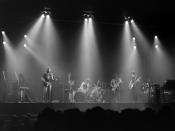English Psychedelic rock outfit Pink Floyd --- already giants in the world of serious rock music --- lifted their fearsome reputation to a new level in 1979 with the release of their double album The Wall. The band, consisting of founding members Nick Mason, David Gilmour and Roger Waters, added to their amazing live act and vast library of superbly performed and well crafted songs focusing upon life, the use of experimental narcotic substances and the evils of excessive consumerism, with this concept album that rallied heatedly against the then bleak, heartless Thatcher government of the late 70s.
Although it was hardly noticed by the teenagers of the era (this author included), The Wall was a themed concept that threaded a narrative throughout the tracks. (Consequently, it makes little sense to the i-Pod user unless the whole album is downloaded.) The central character of the story is a crazed, suicidal junkie.
Given the name of Pink, this young man is betrayed by his parents as a child and brutalized by a strict and uncaring school system that valued conformity and discipline over love and compassion. Since ÃÂWaiting for the Wormsàis one of the last tracks the story is coming to an end. Pink is beyond reach. He is contemplating his own end with the cruel and sarcastic cliché ÃÂGoodbye, cruel world, itÃÂs overÃÂ. The black shirts, fascists and Nazis of conservatism have won and the revolution of hate has started.
ÃÂWaiting for the WormsÃÂ is clearly the most vitriolic attack against the right-wing Margaret Thatcher and her conservative supporters. It combines black lyrics with a musical backtrack that betrays the listener. One moment, it parodies the naked hatred of a Nazi rally. There is marching, foul homophobic and racist language. The enemies are the ÃÂqueens and the Africans and the reds and the Jews.ÃÂ The listener is disturbed, but aware of where they stand. The next, however, the song becomes a sultry siren. ItÃÂs the voice of reason. A relationship of warmth and friendship is established. All one has to do, of course, is ÃÂfollow the wormsÃÂ to the safety of ignorance, hate and intolerance.
To examine the song in detail is to understand how manipulative songwriter Roger Waters was prepared to be of the established popular music genre as it was then known in the late 1970s. The song begins in German. A voice, the voice perhaps of a concentration camp commandant counts to three to kick the action off. Next we hear the cry of Pink. His time on the planet he detests has come to an end. But the music contradicts this. The tone is soft. PinkÃÂs departure is sung with beautiful harmony. The irony is not lost on the listener. His is not a noble end; his ending and the songÃÂs mood are ugly. He is not the tragic hero of a Shakespearean play, just a heroin addict. Interestingly, the final line of the second verse is ÃÂwalk on byÃÂ. The listener knows that he or she will walk past a crumpled Pink. After all, this is ThatcherÃÂs England. They shuffle past broken addicts and vagrants lying in bundles like discarded rags on a daily basis.
The third verse relies upon the extended metaphor of the project to convey its message. The album -- and indeed the subsequent film based upon it ÃÂ is called The Wall as Waters understands how it was ignorance and a lack of action that allowed Hitler and his pack of dogs the leash via the evil sham called the National Socialist Party. People built metaphorical walls around themselves to pretend that things were normal. But good people were being thrown in ovens.
Move oneself to Britain circa 1979. ThereÃÂs a new pack of dogs with a new master: the Conservative Party and Margaret Thatcher. ThereÃÂs a new leader ÃÂsitting in a bunkerÃÂ and Berlin ReichstagÃÂs not on fire, but tonight itÃÂs BrixtonÃÂs Town Hall. A building not being burnt down as a result of Nazism, but conservative politics and the ignorance and fear that goes with it.
In verse five Roger WaterÃÂs then turns his hand to repetition and to a lesser extent rhyme and onomatopoeia. We now have an ugly and pompous right-wing bigot. Melody is non-existent at this point. This sad excuse for a man is simply reading a list to his hateful audience. Guitars and drums are not erratic; however the sound is sharp and nasty. Vile is spitting out as the man unveils his plans for BritainÃÂs conservative future. Most lines simply begin with ÃÂwaitingÃÂ. HeÃÂs ÃÂwaiting to cut out the deadwoodÃÂ, ÃÂweed out the weaklingsÃÂ and ÃÂkick in their doorsÃÂ. HeÃÂs ÃÂwaiting to follow the worms.ÃÂ The rhythm is strong and relentless, just like a marching line of jack-booted thugs stamping on civil liberties: a relentless march of evil. End rhyme ÃÂweaklingsÃÂ/ÃÂwindowsÃÂ and alliteration ÃÂweed/weaklings help to draw the listener into this rant, even though they are terrified of it.
The tone and pace change again at the end. The singer is no longer our enemy. He is our ÃÂfriendÃÂ, the voice of reason harking back to the great days when white ÃÂBritanniaÃÂ ruled. Gentle racist sarcasm is used to win this presumably white listener over to the sides of the worm. People of alternative ethnic or racial backgrounds to traditional Britains become figures of speech. They have no individual identity. This is, apparently, a battle of a superior tribe over inferior ones. Alliteration is used to coin the ÃÂpoliteÃÂ term ÃÂcoloured cousinsÃÂ. Just send the different people away, to the ÃÂshowersÃÂ and ÃÂovensÃÂ perhaps, and we can all sleep safe with the worms.
Depressingly, verse eight ends with the pompous white bigot again. The waiting is over. The plan is being unleashed on Brixton. A peaceful black suburb is about to be destroyed and Britain, not to mention the thoughts and feelings of this most talented songwriter, will never be the same again.
wikipedia.comwww.pinkfloyd.com





